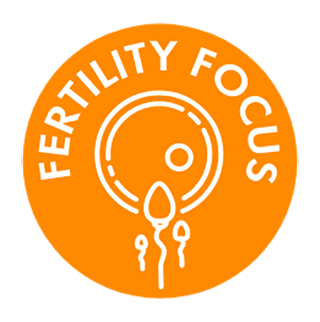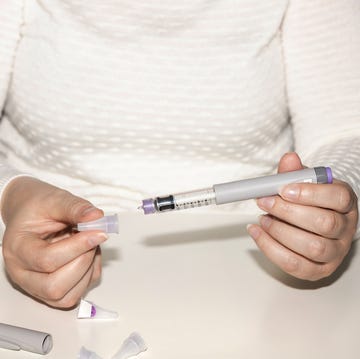Fertility Focus - ELLE explores the myriad experiences of fertility, from surrogacy and miscarriage to hyperfertility and baby loss
I never dreamt of becoming a mother when I was a child. In fact, I avoided the topic of motherhood entirely. While other girls got their periods, mine never came. My mother started menstruating as a late-teen, so I presumed I’d follow suit. But aged 18 and still without sign of first blood, my mother booked me an appointment with a gynaecologist to find out if there was anything to be worried about. Following a series of tests, an ultrasound and a physical examination, I was diagnosed with Mayer-Rokitansky-Küster-Hauser syndrome. It’s a medical condition which causes the vagina and uterus to be underdeveloped or absent (the latter in my case), but external genitalia to appear ‘normal’.
It’s not in my nature to dwell on a problem, so I put any questions about having a family to the back of my mind and headed off to university. I met my now husband in my first year and opened up to him about my syndrome early on in our relationship. He told me he loved me and that if we stayed together, we could look at other options to start a family. Little did we know how difficult that would be.
After we got married, my husband moved to London to continued his postgraduate studies and I followed two years later in 2005, to start my Masters degree. While working there as a clinical researcher and hospital coordinator, eventually we began to consider having a child.
Curious about how we might be able to become parents, my husband and I booked an appointment with a fertility specialist in London who informed us that, while I didn’t have a uterus to carry a child, we didn’t have fertility issues, so surrogacy could be an option. It was a penny dropping moment for us both. While there doesn't seem to be any statutes or laws on surrogacy in South Korea, the process is legal in the UK*.
In 2009, I was referred to an IVF specialist to begin the process of freezing my eggs. The hormone therapy was horrific and made body feel as if it was preparing itself for a pregnancy. The moment my eggs were removed from my ovaries, I felt hollow. I had physically and mentally been preparing myself for a child, but suddenly there was nothing to show for it. It was the first of many experiences of heartbreak to come. All that initial sadness disappeared though, when we were told there were 12 viable embryos to freeze.
My husband and I had always agreed that we’d move back to South Korea if our parents fell ill. So in 2012, when my husband’s father was diagnosed with cancer, we packed up our bags and were forced to leave our frozen embryos behind. The pressures of starting a new job, settling into a new way of life, and a sick father-in-law pushed our surrogacy plans to the background for a while, but in 2014, I finally began looking at ways to transfer our embryos from the UK to South Korea. For various reasons, including tradition and culture, there are no concrete laws on surrogacy in South Korea, making the process problematic.
In 2019, we received an email from our IVF clinic in London informing us that our 10-year storage limit was almost up. The specialists wanted to know whether my husband and I wanted to destroy, donate or ship our embryos overseas. In that moment I realised just how much I desired a family. In a panic, I frantically contacted three hospitals in South Korea who told us they could store our embryos, but not for surrogacy purposes. Fortunately, the London clinic agreed to hold onto our embryos for a bit longer while we tried to find a country that would receive them.
My mother’s friend had watched a documentary in South Korea about intended parents finding surrogates in Ukraine. It was the first time I’d heard of Ukraine as an option. I contacted a surrogacy agency and my husband and I made plans to fly to Kyiv to meet with a potential surrogate in early 2020.
Then Covid-19 hit.
In March 2020, quarantine measures and travel bans were enforced across the world. Weeks into the pandemic I received an email from the London clinic informing me that they were suspending embryo shipping abroad due to increased risk of them getting stuck in customs or being destroyed. The news felt like a cruel joke. We were 10 years into our fertility journey and just when we thought we stood a chance at a family, the opportunity was torn from our hands. We felt helpless. All we could do was wait.
As the pandemic’s impact grew, so too did the world’s knowledge of how best to contain it. In November 2020 I contacted our fertility clinic who finally agreed to ship our embryos to a surrogacy agency in Ukraine. But when our embryos were shipped in January 2021, we learnt that just four viable zygotes (fertilised egg cells) had ‘survived’. Around this time, we agreed on a surrogate who had her own children, aged eight and 12 – both resulting from healthy pregnancies. We felt confident in our decision. In April 2021, an IVF clinic in Ukraine transferred two zygotes into our surrogate’s womb, but they sadly didn’t implant. Days before our final transfer attempt, we learnt that our surrogate was suffering from a minor infection in her uterus. Rather than search for another surrogate, we waited for the infection to clear and in June 2021, the final zygotes were transferred.
She was pregnant. The joy we felt on hearing this news was immeasurable. After all these years, I was finally going to be a mother.
Over the next few months, we were allowed contact with our surrogate through our agency in Ukraine and were sent countless ultrasound scans and test results. We found out we were having a boy, so we began decorating his bedroom, filling cupboard drawers with baby clothes and building his cot. My husband even started writing a diary, documenting how he felt every day as he waited for our son’s arrival.
Our surrogate was due to give birth in mid-March 2022, so I planned to fly to Kyiv at the end of February in case my son arrived early. My flights, accommodation and annual leave were all booked, but as the due date approached my husband and I began to hear rumblings of tension between Ukraine and Russia on the news. Our surrogacy agency in Ukraine told us of a long-standing political issue that didn’t affect civilians on the ground, so there was nothing to worry about. That was, until the South Korean government put a travel ban to Ukraine on February 11. Two weeks later, the Ukraine-Russia war broke out. Our surrogate was 37 weeks pregnant.
At a loss for what to do, I applied for a travel exception through the Ministry of Foreign Affairs in South Korea, explaining that I needed to enter Ukraine for humanitarian reasons. I begged with officials to let me fly but was told my case would be difficult to review due to the heightened risk. One of the officials suggested I ask my surrogate to leave Ukraine and meet her in a different country. At the time the idea seemed absurd.
As the war became more bloody and gruesome, and her due date approached, our surrogate agreed to leave her children and husband in her hometown, two hours south of Kyiv, and evacuate to Poland to give birth to our son. Growing Families, a non-profit that supports intended parents engaged in cross-border surrogacy, informed us that an evacuation bus departing Kyiv on the morning of Saturday, March 5 that would transfer civilians to Poland. With no taxis running to the evacuation locations, hours later we learnt our surrogate had missed the bus. After a series of frantic phone calls and emails, a Geneva-based NGO (non-government organisation) working with Growing Families told us there was a seat for our surrogate on another humanitarian train leaving Kyiv two-and-a-half hours later and I booked a driver to pick our surrogate up from her house to take her to the train station. Meanwhile, my husband and I sat helpless at home watching footage of Ukrainians on the news. Many were screaming and crying as they attempted to board packed trains. Women and children clung to each other amid the commotion. My heart sank as I envisaged our pregnant surrogate being injured in the crowds or going into labour mid-journey.
Hours later, I received a text message from our agency informing us that our surrogate’s train to Poland hadn’t arrived. She was left standing on the train platform with her luggage, waiting. Worse still, a city-wide curfew in Kyiv prevented the driver from picking her up to take her home. Our surrogate was going to be left alone at night, stranded. I began to sob. Not only was our surrogate’s safety at risk, and but also our child’s. Fortunately, the delayed train arrived that evening, but it would take 24 hours for our surrogate to arrive in Poland.
My husband and I arrived in Poland on March 7 and headed to a hospital which had agreed to deliver our son. On March 10 we met with a Polish lawyer who informed us that taking our surrogate out of Ukraine meant that our surrogacy agreement had become invalid, given the difference in laws between Poland and Ukraine. We were told that our surrogate and her husband would likely be named as our son’s mother and father on his birth certificate. The lawyer proposed organising an ambulance to drive the surrogate over the Czech Republic border, where surrogacy laws are more lenient. But at that point, making sure our baby was delivered safely was our top priority. Our surrogate had already risked enough for us, and we felt prepared to go through the lengthy and arduous administrative battle to adopt if necessary.
When I met our surrogate in person I wrapped my arms around her and we both broke down into tears as we held each other. With the help of Google Translate, I thanked her for everything she’d risked for us to have a child. On March 10, we met with a doctor who told us to return the following day for the surrogate to undergo further testing, but hours later we received a call from her to say that her waters had broken. Our son was on his way. We raced to the delivery ward and given she was only allowed one person in the delivery room with her, I stayed at the hospital while my husband returned to our accommodation. After massaging her back through her contractions I underwent a routine Covid-19 test while she was administered an epidural. To my devastation, I tested positive. I’d been so tired planning the surrogate’s evacuation from Ukraine that, despite having a sore throat, I hadn’t considered I’d come down with Covid. I was moments away from seeing my son be born but was shown the door and sent back to our hotel.
Our surrogate gave birth to our son six hours later, on March 11. We named him Sean, which is Irish for ‘gift from God’. Two days later we were able to take him back to our apartment while our surrogate recovered from the delivery. While most parents spend the first days of parenthood getting to grips with night-time feeds and nappy changes, my husband had to visit the South Korean Embassy in Poland to find out how we’d be able to take Sean back home. The embassy told us it was difficult for them to provide help. They gave us the details of a law firm in Poland instead. After much back and forth, our Polish lawyers managed to attain a document – signed by our surrogate - which stated that, despite us not having any legal rights over Sean, we could have power of attorney to act his guardians. On March 26 our surrogate decided to return to Ukraine to be with her family.
Over the next couple of weeks, our case was tossed between Ukraine's embassies, lawyers and government officials as they tried to figure out where the responsibility for our unprecedented situation lay. Lawyers in Ukraine believed our case should be reviewed under Ukrainian law, and while officials in the Ministry of Justice in Ukraine agreed, they weren’t sure who was legally permitted to amend Sean's birth certificate if he was registered in Poland. At this point, all we could do was wait as Ukraine's Ministry of Justice examined our case.
Unfortunately, my husband was forced to return to South Korea for work, so my mother flew to Poland to help me care for our newborn while I liaised with lawyers. At this point I’d been in Poland for over two months and my 90-day visa was nearing its end. One day, our lawyer called me to say that Ukrainian officials had refused to comment on our case. We felt so helpless. We weren't sure whether this meant our case had been refused, or that officials weren't able to provide details over the phone. In the meantime, we were told to wait for an official letter. It was heart-breaking news. I had to leave Poland by June 3, but I couldn’t bear the thought of leaving my son.
We urgently began researching ways to apply for a South Korean visa for Sean and how to adopt him. In a last ditch attempt, we applied for a travel certificate and visa for him through the Ministry for Foreign Affairs in South Korea on May 30. After being passed between the passport department and South Korean Embassy in Poland like a rag doll, I learnt on June 1 that the Minister of Foreign Affairs in South Korea would review our case. But, given that it was a national holiday, all of their offices were closed. The next morning I called the office for an update and was told that our case was still in review. At my wit’s end, I told the official that my Polish visa was due to run out in 24 hours. I couldn’t wait any longer. She told me to ring back in an hour while she found out more information. It was one of the most painful waits of my life. An hour later I found out that the Korean embassy in Poland had finally agreed to grant Sean’s visa. After a three-month wait, I was leaving Poland with my baby.
On June 3, I boarded a flight with Sean fast asleep in my arms. The whole journey took an exhausting 25 hours, including a 10-hour stopover in London. I didn’t sleep a wink on the flight - I was terrified something would go wrong.
As it stands, my husband and I are not Sean's legal parents. We face months, if not years, of going through the family courts in South Korea in the hope that a judge will review our case and find the compassion to recognise Sean as our own. We’re facing a mountain of challenges - it’s new territory for us, our lawyers and government officials across several different countries with contradicting and confusing laws on surrogacy. And yet, I think back to all of the pain we've been through over the years and I know I’d go through it all over again if it meant we’d have Sean.
We look forward to the day when Sean is old enough to learn about his journey here and the surrogate who risked her life for him. So many people from around the world rallied to help give us this opportunity for parenthood – we are forever grateful. When I hold my son in my arms, I feel like I’m holding the world.
*While surrogacy agreements are legal in the UK, they are not enforceable by UK law. Find out more here.
Growing Families is a not-for-profit organisation which who works with intended parents around the globe to educate and support their family building. Find out more here.




















